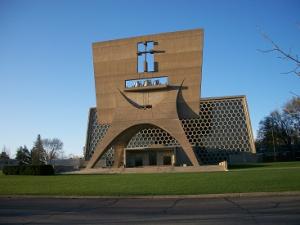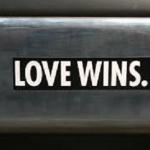 During my sabbatical semester over a decade ago at an ecumenial institute on the campus of a Benedictine university, I participated in morning, noon, and evening prayer almost every day with the monks at the large Benedictine abbey on campus. In the four months of my sabbatical we read the entire cycle of the Psalms two or three times. One of my favorites became Psalm 148, which tells us that
During my sabbatical semester over a decade ago at an ecumenial institute on the campus of a Benedictine university, I participated in morning, noon, and evening prayer almost every day with the monks at the large Benedictine abbey on campus. In the four months of my sabbatical we read the entire cycle of the Psalms two or three times. One of my favorites became Psalm 148, which tells us that
[The Lord] executes justice for the oppressed [and] gives food to the hungry. The Lord sets the prisoners free; the Lord opens the eyes of the blind . . . The Lord watches over the strangers; the Lord upholds the widow and the orphan . . .
In one gospel account, John the Baptist has been imprisoned by Herod Antipas and will be executed soon. John sends some of his disciples to Jesus in order to ask his cousin a poignant question: Are you the one who is to come, or are we to wait for another? Jesus is clearly channelling Psalm 146 when he tells John’s disciples to return to their master with the following report:
Go and tell John what you hear and see: the blind receive their sight, the lame walk, the lepers are cleansed, the deaf hear, the dead are raised, and the poor have good news brought to them.
Such texts are so familiar that it is easy to forget just what is being required of the reader and listener.
One of my favorite courses over the more than three decades that I have been a college professor is “Love Never Fails: Grace, Truth, ad Freedom in the Nazi Era,” a team-taught interdisciplinary colloquium that I have taught five times with a close friend and colleague from the history department. Over the years we have read dozens of texts related to the Nazi period; among them,Daša Drndić’s Trieste is the most powerful, unrelenting and unforgiving book related to the Holocaust I have ever read. As a reviewer for Amazon wrote, “Trieste is not a book for the faint-hearted, either in style or subject. . . . Enter if you are brave enough, and if you stay the course you will be changed.” No one—those in authority, the church, those who turned their heads, those who simply did whatever they could to stay alive—are spared in this brutally honest and unflinching account of what human beings are capable of.

Drndić’s book reminds me of something post-Holocaust Jewish theologian Irving Greenberg wrote: “No statement, theological or otherwise, should be made that would not be credible in the presence of the burning children.” With regard to those men who were at the same time both murderous killers and yet tender fathers and husbands, Drndić writes that a father is not “a sacrosanct being . . . There are no sacrosanct beings. Even God is not sacrosanct, perhaps He least of all.” To those who wish to excuse the culpable silence and frequent collaboration of religious institutions, she writes that “this caricatured parade and more than revolting fabrication, this costumed theatre of transparent lies and empty promises should be done away with right now, once and for all.”
For a number of reasons, last Sunday was my first Sunday in church in over three months. The first reading from the Jewish scriptures was an eye-opener. Isaiah 58 begins with the prophet mimicking the complaints of the “house of Jacob”: We have been fasting and humbling ourselves, just as you require. Why aren’t you answering our prayers? Why aren’t you taking notice? In response the prophet laughs with the voice of God.
Look, you serve your own interest on your fast-day, and oppress all your workers. Look, you fast only to quarrel and to fight. Is such the fast that I choose? . . . Is it to bow down the head like a bulrush, and to lie in sackcloth and ashes?
In other words, your “fast-day” is all about you. It’s all about your pitiful and self-centered attempts to twist divine favor in your direction. It’s all about having convinced yourself that skipping a few meals, that attending a few extra meetings at your preferred house of worship, and that arguing with each other about which forms of ritual are best are all that it takes to draw God’s favorable attention. “You call this a fast, a day acceptable to the Lord?”
You want to know what a real fast-day would be like? What it would really be like if you humbled yourselves? Here’s a clue:
To loose the bonds of injustice
To undo the thongs of the yoke
To let the oppressed go free
To share your bread with the hungry
To bring the homeless and poor into your house
To cover the naked when you see them
Try doing that for a while and see what happens.
In Isaiah’s prophetic tones, the call to attend to the hungry, poor, widows and orphans is not a suggestion or an invitation to try out something new. The text from Isaiah is a flat out command. Just do it. And until you do, stop pretending that you are anything other than a self-centered piece of crap. And stop expecting anything other than a perpetuation of the continuing, sad human story of injustice and violence. Period.
Over the past few years, as my teaching colleague and I have proceeded through the early weeks of our colloquium on the Nazi era with very bright nineteen- and twenty-year-olds, the most frequent sort of question raised is “How could they have done this?” or “How could people have gone along with those who were doing this?” Trieste convinced us that before proceeding with these students–for whom the Holocaust is history as ancient as Julius Caesar and Pericles–to love, grace, truth and freedom in the midst of horror, more time should be spent in the horror part. No one in Trieste dropped in from an evil planet other than Earth—each person is a human being with darkness ready to erupt when inattentiveness and self-interest push common human decency into the background.
When one of the characters in Albert Camus’ The Plague is described as a “saint,” he responds “I have no interest in being a saint. I’m more interested in being a man.” This strikes me as a good place to start. A central problem illuminated by texts such as Isaiah 58 and Trieste is the powerful human tendency to set the moral bar so low that even the most basic moral behavior looks like heroism or sainthood—a standard perhaps to be admired but not one that I hold myself to.
We are told in sacred texts over and over again that God demands that we be fundamentally aware of each other. But the belief that basic morality and common decency require a conscious awareness of needs other than our own, particularly those of other human beings, need not be rooted in religious faith or practice. Whatever it takes to convince even a few of us that not only our thriving, but our very existence and survival depends on expanding the membership of our moral community to more than one is worth hanging on to.
On the final page of The Plague, at the end of a harrowing tale of individuals fighting against an out-of-control evil that could not be stopped, the main character Dr. Rieux takes stock of what he has learned now that the plague has left as inexplicably as it came.
He knew that the tale he had to tell could not be one of a final victory. It could be only the record of what had had to be done, and what assuredly would have to be done again in the never ending fight against terror and its relentless onslaughts, despite their personal afflictions, by all who, while unable to be saintly but refusing to bow down to pestilences, strive their utmost to be healers.
This is both a thankless and glorious assignment, one that William James in “The Will to Believe” recommends that we embrace with enthusiasm:
For my own part, I do not know what the sweat and blood and tragedy of this life mean, if they mean anything short of this. If this life be not a real fight, in which something is eternally gained for the universe by success, it is no better than a game of private theatricals from which one may withdraw at will. But it feels like a real fight,—as if there were something really wild in the universe which we, with all our idealities and faithfulnesses, are needed to redeem; and first of all to redeem our own hearts from atheisms and fears.












